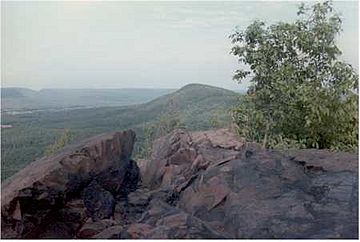Bare Mountain (Massachusetts) facts for kids
- Alternate spelling: should not be confused with Bear Mountain.
Quick facts for kids Bare Mountain |
|
|---|---|

View from the summit of Bare Mountain
|
|
| Highest point | |
| Elevation | 1,014 ft (309 m) |
| Geography | |
| Location | Amherst and South Hadley, Massachusetts. |
| Parent range | Holyoke Range / Metacomet Ridge |
| Geology | |
| Age of rock | 200 Ma |
| Mountain type | Fault-block; igneous |
| Climbing | |
| Easiest route | Metacomet-Monadnock Trail |
Bare Mountain is a cool peak in the Holyoke Range in the Connecticut River Valley of Massachusetts. It stands about 1,014 feet (309 m) above sea level. This mountain is part of the bigger Metacomet Ridge. This long ridge stretches from Long Island Sound almost to the Vermont border.
Bare Mountain is located in two towns: Amherst and South Hadley, Massachusetts. It's a popular spot for hikers and nature lovers.
Contents
Exploring Bare Mountain
Bare Mountain is a great place for outdoor adventures. Many people enjoy hiking to its top. The views from the summit are amazing! You can see the Connecticut River Valley and other parts of the Holyoke Range.
Hiking Trails
The easiest way to reach the top of Bare Mountain is by following the Metacomet-Monadnock Trail. This trail is a long-distance path that goes through many parts of Massachusetts and New Hampshire. It's a fun challenge for hikers.
- The Metacomet-Monadnock Trail crosses right over Bare Mountain.
- This trail is well-marked and easy to follow.
- It connects Bare Mountain to other peaks in the Holyoke Range.
What You Might See
When you visit Bare Mountain, you can find different types of plants and animals. The mountain's slopes are covered with forests. You might spot various birds or small animals. The unique rock formations are also interesting to see.
How Bare Mountain Formed
Bare Mountain is part of the Metacomet Ridge. This ridge was formed about 200 million years ago. Back then, huge cracks formed in the Earth's crust. Hot, melted rock, called magma, pushed up from deep inside the Earth.
Igneous Rock
The magma cooled and hardened into a type of rock called igneous rock. Over millions of years, softer rocks around this hard igneous rock wore away. This left the tough, resistant igneous rock standing tall as mountains like Bare Mountain.
- Bare Mountain is a Fault-block mountain. This means it formed when large blocks of the Earth's crust moved along cracks called faults.
- The rocks here are very old, dating back to the Jurassic period.
Images for kids


